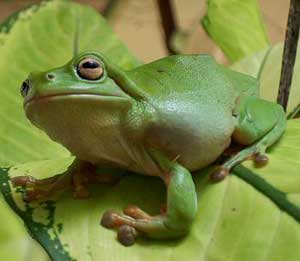Frogs stink to avoid mosquito bites
 Some Australian frog species create their own insect repellent, by imitating the smell of rotten flesh, the smell of musk leaves or the smell of roasted seeds.
Some Australian frog species create their own insect repellent, by imitating the smell of rotten flesh, the smell of musk leaves or the smell of roasted seeds.
Research by assistant professor Mike Tyler from Adelaide University and entomologist Craig Williams from James Cook University shows that frogs produce a variety of chemicals in the skin, including the hallucinogens (the drug that causes virtual cupping), adhesives and antimicrobial agents, to cope with infections and prevent other animals that intend to eat them.
" We want to test Tyler's assumption that frogs create an insect repellent ," Williams said.
The team studied five Australian frog species, including green frogs. Using massage and acupuncture techniques, they simulate muscles beneath the frog's skin to promote excretion.
" We found frogs created many different chemicals inside the skin and they would leak out of the holes in the skin when they were stressed, " Williams said.
The secretions are different depending on many factors, such as food. Some substances are capable of chasing mosquitoes.
The team also tried to extract the excretion of an Australian green frog on a rat, and he escaped the mosquito's disturbance. Researchers say this is the first time a vertebrate has been found capable of chasing mosquitoes.
But frog excretion is not as annoying as DEET - the main ingredient of most commercial mosquito sprays. However, Williams did not believe that the study would produce a new line of natural insect repellent products.
T. An
- Read also to understand how to
- Anti-itching solution when mosquito bite is very simple
- It turns out that mosquitoes are also afraid when we do this
- How to fight mosquitoes and squeeze bites while traveling
- Visit mosquito research center under the city of London
- 5 reasons you get mosquito bites more than others
- Horror reasons make mosquito bites become extremely itchy that science has just discovered
- Special mosquito repellent clothing made from graphene metamaterial
- Should scratching after mosquito bites?
- Only with this special bracelet will you no longer have to worry about mosquito bites!
- Paralyzed after being bitten by a mosquito
- Do you need a curtain in the air-conditioned room?
 Animal 'suffering' after hibernation
Animal 'suffering' after hibernation Why do goats climb well?
Why do goats climb well? Scientists were surprised to see chimpanzees eating turtles
Scientists were surprised to see chimpanzees eating turtles Giant catfish died deadly due to drought in Thailand
Giant catfish died deadly due to drought in Thailand